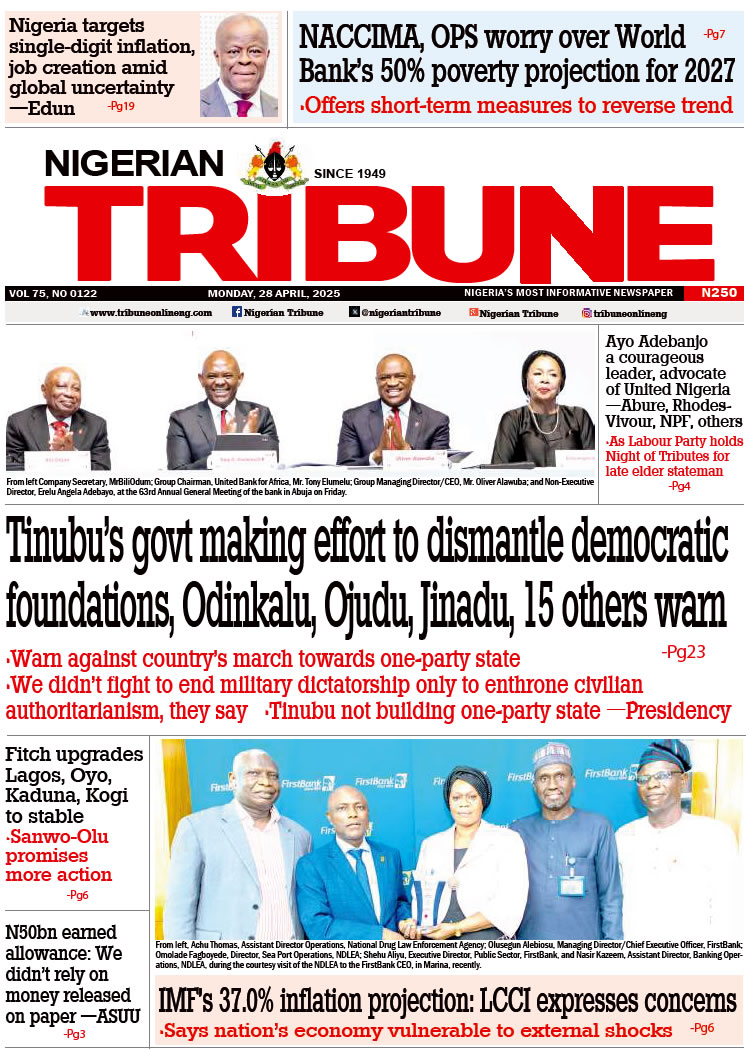Looking at the activities of domestic airline operations in Nigeria with reference to the operational activities of Air Peace airline in the past five years, SHOLA ADEKOLA examines the effects of the past and the present, using Air Peace model to beam a ray of hope in air transportation in Nigeria
Domestic airlines in the past
some years ago, many Nigerians particularly those belonging to the flying class had expressed their misgivings about the performances of the domestic airlines with majority describing them as failures. This notion persisted for various reasons ranging from the untidy manner they did the business in sharp contradiction to global best practices guiding the business of airline. This has been said to be the factor responsible for their short life span.
It is on record that between the 1970s and late 1980s there were over 20 Nigerian airlines flying to different parts of the country, with some even flying the flag of Nigeria into some regional and intercontinental routes, and meeting the needs of Nigerians who have been known to be addicted travellers.
Gone are the days Nigeria could boast of airlines like the then national carrier, Nigeria Airways; Okada, Kabo, Chachangi, IRS, Space World, Harka, Freedom Air, Kolkol, Fassey Royals, Concord, Sosoliso, ADC and many more.
Those are the days many Nigerian travellers actually enjoyed competition and availability of alternatives created by the presence of such airlines and the subsequent respect they enjoyed from the foreign airlines that had to compete with the defunct national carrier on the foreign routes.
Gradually, this pride began to nosedive from the late 1980s and the early 1990s owing to many reasons such as lack of understanding of how to run an airline without mixing it up with egotistical tendencies, faulty ownership structure, appetite for indebtedness, diversion of proceeds to irrelevant business enterprises, and failure to embrace global trends like alliances, mergers and code sharing.
Despite the hue and cry from key players, many of the then airline owners out of sheer pride laced with local ideologies failed to read the handwriting on the wall as they continued in their old ways and gradually, each of the airlines began to give way, and they all fell like a pack of cards.
By the late 1990s, many of the airlines had disappeared from the domestic scene with just about four or five struggling to now attend to the needs of the Nigerian flying public.
The last straw that broke the camel’s back was the controversial liquidation of the Nigeria Airways between 2003/2004.
This period can be referred to as the dark era as many Nigerian travellers suffered untold hardship brought upon them by the near total collapse of domestic airlines, and the one or two flying on some regional and international routes, and their subsequent exploitation in the hands of foreign airlines that capitalised on the absence of domestic carriers to explore the lacuna created by the situation to feed fat.
There was relief with the coming of airlines like Medview, Dana, Arik and Aero as they were able to bring succour to the travelling public. The joy these airlines brought sadly did not last too long as they were gradually bitten by the familiar bugs that had earlier fleeced the first group of the airlines before them.
While two of the latest set of the airlines got indebted to the extent that they were almost reaching the level of bankruptcy, the Federal Government through its agency, AMCON, came to their rescue while the remaining two or three continued to operate under serious hardship.
Dangote’s $12bn world’s largest subsea pipeline to transport 3bn scuf daily
Air Peace as the messiah?
At a point when the Nigerian travelling public had written off the domestic airlines with many of them now becoming the guinea pig in the hands of the foreign airlines, while some had to travel to neighbouring countries like Ghana to connect flights to their final destinations, there came an unknown airline in 2014.
When the news about the entrance of Air Peace to the domestic airline scene was announced by relevant aviation authorities then, no Nigerian especially the flying ones was elated as many believed the airline would only follow the path of the previous ones before dying.
The first challenge that confronted the owner of the airline, Mr Allen Onyema, was the association of the airline with one of the past First Ladies due to the similarity in the name of the airline to that of the then First Lady.
Despite his explanation and promises to Nigerians that Air Peace, having done the background studies on how to run such a sensitive and capital enterprise in line with international standards with a well orchestrated business plan, and urging Nigerians to give the airline benefit of the doubt, many were still not convinced.
The first shocker that key players in the sector got which made many to begin to take interest in Air Peace came in the number of aircraft it started operation with.
The airline at a go started with seven aircraft which was a far departure from the two start up aircraft policy the Nigerian Civli Aviation Authority (NCAA) had on ground then.
Between 2014, when the airline joined the airline business and present, its fleet has grown from seven to 25 with another 20 being expected to join the fleet in less than seven months according to the chairman of the airline, Mr Allen Onyema.
Early this year, 10 new Max aircraft had been ordered from Boeing, until the aircraft type had issues, just as a number Embraer aircraft had been ordered.
Besides the sophisticated new aircraft the airline is parading which can compete favourably with the ones in the fleet of the mega carriers of this world, the order for 10 aircraft at a fell swoop has not only left key players excited, but sent jitters down the spines of many of the foreign airlines that did not see an airline from Nigeria, or even Africa making such a large order at once at a time when airline business was becoming almost unsustainable.
Presently, Air Peace flies to different parts of the country thus bringing relief to some states that had hitherto been neglected by the non availability of adequate domestic carriers to operate there. The airline also operates regional flights to places like Freetown, Banjul, Dakar and Accra.
Besides operating into some West African countries, the airline, having commenced operations into Sharjah via Dubai in the Middle East, has also been designated on international routes of London, Guangzhou in China, Houston, Mumbai and South Africa.
Achievements
It is on record that the airline since inception five years ago has recorded so many ‘firsts’ on the domestic airline scene including: being the first to appoint a female as its managing director, first to own and operate six Embraer 145 in West Africa, first to launch its inaugural flight with seven aircraft, first to have an all female Nigerian crew operate a wide body aircraft in Nigeria, the first to register and operate two 777 in West Africa, the first to own four Boeing 777 at a go, and the first to order 10 Boeing 737 Max aircraft yet to be taken delivery of before the aircraft type had global issues.
Apart from the above feats, the airline in its quest to be a pacesetter in the country and even on the continent, again recently scored another first when its owner took up the role of a national carrier by volunteering to help the Federal Government to airlift over 500 distressed Nigerians caught up during the xenophobic attacks against Nigerians and other Africans by South Africans.
The positive vibes this generated amongst Nigerians and government officials still continues with many calling on the government to compensate the airline by supporting the owner in his quest to fly the flag of Nigeria across the world and bringing the public’s lost confidence in domestic airline business.
Key players react
Following the five years anniversary of the airline last week, stakeholders while commending the airline on the feats it has achieved and how it has been able to bring a great relief to domestic airline operations in the country in particular, many have agreed that the airline had to some extent proved that domestic airline business can do better if investors who really understand the running of airline venture into it with the government playing its part of formulating and implementing friendly policies.
They have, however, advised that Air Peace like other airlines tread softly in its move to expand operations on the international routes, urging it to take one step at a time to avoid falling into the booby trap which had consumed many Nigerian carriers.
For the Managing Director of Centurion Security Services and a one time commandant of the Murtala Muhammed Airport, Group Captain John Ojikutu (retired), “The airline is doing relatively better on the domestic routes than others. It should target 10 million passengers from at least 15 of the domestic airports. Rather than go into competition with the foreign airlines on the international routes, it should do co-sharing with them. It should do more business on the regional and continental routes than on the intercontinental routes.”
Equally, a director at the Zenith Travels in Lagos, Mr Olumide Ohunayo, praised Air Peace for making its impact felt these five years through increase in schedule and frequencies on the domestic and international routes. “Air Peace is the biggest carrier in the Nigeria’s airspace as at today, and much as we appreciate what it has done, we also need to advise it on the need to apply caution in its speed of expansion on the international routes so that it does not become a victim of international aero-politics.
“Air peace will need to take a deep breath on the zeal for international flight operations. On the international routes it has been designated, it should consider having some commercial international airline partners, agencies and other groups that can help fill its aircraft and probably take its passengers to points beyond those foreign destinations advertised. This can only be done when you have commercial alliances with some international airlines and code share under commercial terms. I also need them to look at their schedules in Nigeria as we found out that their flights don’t depart on time and this has been a recurring decimal with complaints from customers. They need to work on this so that passengers can see a new improved departure time from the airline.”
‘FG should be more proactive’
Many have also argued that with the feats so far achieved by Air Peace in its five years of existence, that domestic airlines can get things right if the Federal Government can tag along with them through the implementation of flexible policies that will make the local airlines in more comfortable. Stakeholders who spoke to Nigerian Tribune on how the airline has fared in the last five years declared: “With these and more, we have a strong argument to justify that local carriers can get it right. If the government would listen to their yearnings, using the Air Peace example as a model, the industry will be in for greater heights.”
According to key players, one of the ways the government can further assist Air Peace and other domestic carriers to do better is for the Federal Government to improve aeronautical facilities especially the navigational and landing aids at most airports to extend their operational hours beyond sunset and for landing in inclement weather. If government through the Nigerian Airspace Management Agency (NAMA), they argued, can provide category three Instrument Landing System (ILS) which are originally meant for category one airports, for some category two airports like Enugu, government should be magnanimous enough to provide category two ILS for the category three airports.
Talking about making the business environment more friendly, stakeholders are also calling on government to tackle the infrastructure challenges at the airports which are contributing to the problems of the local airlines.
“Government must keep improving and expanding on the infrastructure and that is non negotiable, flight operations outside the four international airports should also be increased. If we have these, the other things that need to be done might not be totally aviation issue wise but the general issues affecting the country.
Identifying excessive charges being slammed on the local airlines as a serious factor militating against the local airline business, the leadership of the airlines have been advised to come up with the charges of the neighbouring countries so that it can be used to negotiate with the government.
Conclusion:
The general notion is that some of the Nigerian carriers can do better if they enjoy the supports of government in the area of helping them to review the multiple taxes, not only reducing the exorbitant price of aviation fuel but also making it available, tackling the unstable foreign exchange and willingness of government to protect the local airlines within and outside the shores of the country. With these and more, it is believed that the local carriers using the model of Air Peace can get it right and thus make flight activities on the domestic scene become more lively and robust also meaning more revenue generation for the government.







